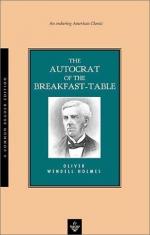|
This section contains 1,779 words (approx. 6 pages at 300 words per page) |

|
The displacement of Van Wyck Brooks from the center to the farthest margins of literary influence today is surely a stunning shift of taste. In 1920 Brooks was regarded as the undisputed heir of the great tradition in American thought—the radical, reformist, prophetic, "organic" tradition which adopted Emerson as its source of inspiration, took The American Scholar as its point of departure, and envisioned as its point of terminus a civilization in which the creative spirit, in all its social and imaginative forms, might flourish. To this old enterprise Brooks had brought intransigent zeal and incomparable flair—a genius for clarifying thought, said his comrade-at-arms on The Seven Arts, James Oppenheim. Today, Brooks's sovereign role in the transmission of this classic American tradition, his oeuvre of inquiry into its bearing on modern letters in America, is either ignored or disdained. (p. 5)
[Brooks eventually] came to think that America...
|
This section contains 1,779 words (approx. 6 pages at 300 words per page) |

|


